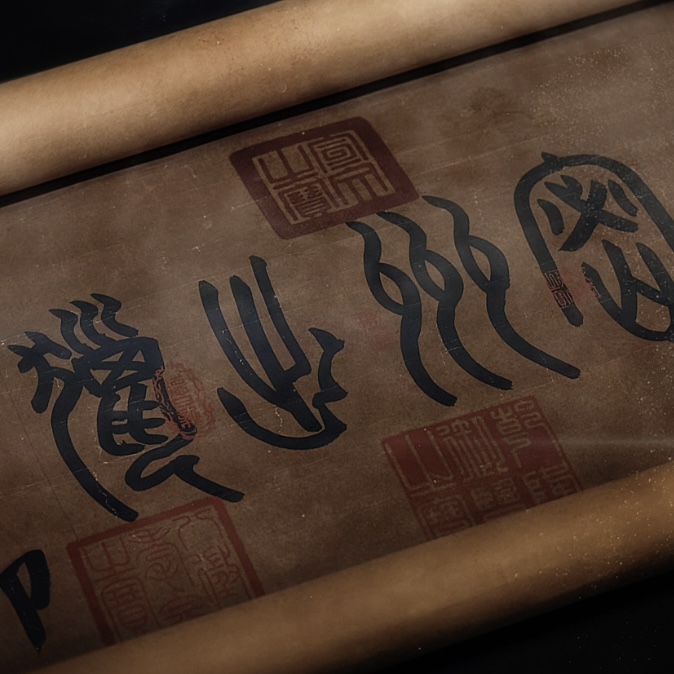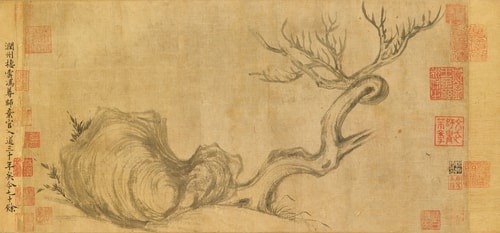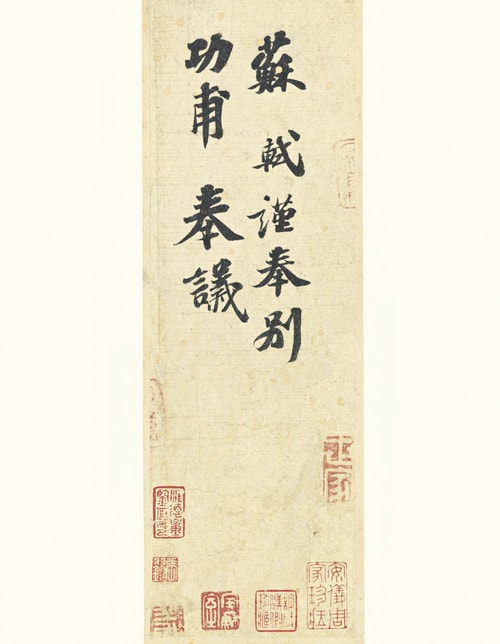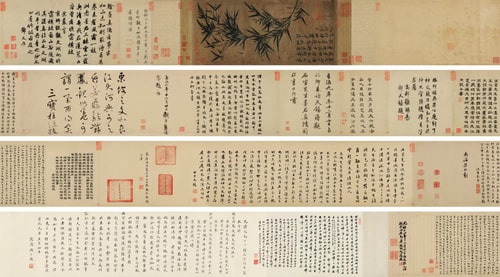Song Dynasty, Su Shi, Running Script in Chinese Calligraphy, Poem on Hunting Outside Mizhou, Rare Hanging Scroll

Log in to view your Launchpad status.
Start time
2025-03-10
12:00
End time
2025-03-19
12:00
Distribute tokens
2025-03-19
16:00
Estimated time of trading
2025-03-20
04:00
Sale rules
Token Name: MICHO
Issuer: Japanese Collector Family
Total Supply: 10,000,000 (92% publicly issued)
Issuance Price: 0.1 USDT/MICHO
Underwriter: NCollector Platform
Issuance Fee: 8% (held by NCollector Platform)
Participation Requirement: Whitelisted users only
Token Holder Rights
Ownership Rights: The physical asset belongs collectively to all MICHO token holders. Each MICHO token represents a one-ten-millionth share of the asset's ownership.
Proposal Rights: Holders of more than 3% of MICHO tokens have the right to initiate proposals, such as voting on external exhibitions, auction consignments, and IP licensing.
Voting Rights: Token holders can stake their tokens to vote on various proposals, such as deciding whether to send physical collectibles to top auction houses like Sotheby’s or Christie’s for auction. If affirmative votes reach 51% of the total token supply, the platform will proceed with the auction process and deliver the collectibles to the auction house. The net proceeds from the auction will be distributed to all token holders in proportion to their holdings. After distribution, the corresponding tokens will be uniformly burned.
Revenue Rights: Token holders are entitled to profits generated from exhibitions, licensing, and derivative product issuance. These earnings will be distributed based on snapshots taken at specific time points.
Mandatory Buyout Rights: Once the secondary market is open, holders of 67% of MICHO tokens can initiate a mandatory buyout offer to the remaining 33% of holders at the average market price over the past seven days.
Physical Redemption Rights: A holder who acquires 100% of MICHO tokens can apply for the physical delivery and ownership confirmation of the asset. Upon completion, the corresponding tokens will be permanently burned.
About this artwork
Title: Hunting Outside Mizhou – Rare Standing Scroll in Running Script by Su Shi (Song Dynasty)
Artist: Su Shi
Provenance: Formerly held in a Japanese family collection
Current Location: Japan MUFG Bank Vault
Market Valuation: $15,000,000 – $25,000,000
Valuation Rationale: In September 2013, Su Shi's Gong Fu Tie was auctioned at Sotheby's New York for $8.22 million, despite containing only nine characters: "Su Shi respectfully bids farewell to Gong Fu Fengyi". In contrast, Hunting Outside Mizhou features 74 meticulously crafted characters and has been treasured by generations of emperors, renowned calligraphers, and esteemed collectors. It was ultimately housed in the Qing imperial archives and cataloged in Shiqu Baoji, with an unbroken provenance. As one of the finest surviving works by Su Shi, its estimated value of $15,000,000 – $25,000,000 USD remains significantly below its true worth, offering immense appreciation potential.
Provenance:
- Zhao Mengfu (1254–1322)
- The Mu Ying Family, Princes of Qianning, Yunnan (1383–1647)
- Wang Chong (1494–1533)
- Xiang Molin (1525–1590)
- Emperor Kangxi (1662–1722)
- Song Luo (1634–1714)
- Emperor Yongzheng (1678–1735)
- Emperor Qianlong (1711–1799)
Essential Information
Name: Song Dynasty - Su Shi - Running Script - Poem Hunting Outside Mizhou - Rare Hanging Scroll
Author: Su Shi
Dimensions: 122 cm × 156 cm (painting core)
Material: Gold-Flecked Paper
Format: Hanging Scroll
Inscriptions
(1) Su Dongpo
(2) "As an awl etches into sand" — Emperor Qianlong
(3) "The brushstrokes flow effortlessly, radiating both vigor and elegance, imbued with a sense of grandeur and vitality, with each character full and firm, yet retaining the charm of the Jin and Tang dynasties." — Zhao Mengfu
(4) "With concise strokes, the brushwork is rich and solid yet not heavy, displaying dynamic tension in its lines, firm brushstrokes, and naturally graceful beauty." — Wang Chong
Seals
(1) Signature seal: Meiyang Su Shi - 眉陽蘇軾
(2) Appreciation seal: Jichou Wufu - 箕疇五福 (Inscription)
(3) Appreciation seal: Zhao Mengfu’s Seal - 趙孟頫印 (Inscription)
(4) Appreciation seal: Wang Chong’s Private Seal - 王寵私印 (Inscription)
(5) Appreciation stamp:
Treasure of XuanWen – 宣文之宝
Imperial Inspection Treasure of Kangxi – 康熙御览之宝
Shangqiu Song Family Book Collection – 商丘宋氏收藏图书
Luo (a personal or symbolic seal) – 犖
Imperial Inspection Treasure of Yongzheng – 雍正御览之宝
Treasuring Only the Virtuous – 所宝惟贤
Endless Repository of Mist and Clouds – 烟云无尽藏
Secret Treasures of the Hall of Three Rarities - 三希堂秘藏寶
Ancient Rare Emperor - 古希天子
Recompiled Register of Treasures - 寶籍重編
Treasure of the Emperor Mandated by Heaven - 皇帝奉天之寶
Authenticated by the Shiqu Repository - 石渠定鑑
Treasure of the Perfect Old Man - 十全老人之寶
Refined Seal of the Hall of Three Rarities - 三希堂精鑒璽
Treasure of Eight Virtues and Reverent Longevity - 八徵耄念之寶
Treasure of the Great Qing Mandate - 大清受命之寶
Longevity - 壽
Virtue Renewed Daily - 德日新
Additional Entry of the Ning Shou Palace into the Shiqu Archives - 寧壽宮續入石渠寶笈
Treasure of the Ancient Rare Emperor of the Hall of Five Blessings and Five Spirits - 五福五倀堂古希天子寶
Imperial Calligraphy of Qianlong - 乾隆宸翰
Ink Dew - 研露
Treasure of the Qianqing Palace - 乾清宮寶
Diligent as Ever - 猶日孜孜
Blessing for Future Generations - 宜子孫
Authenticated Genuine Work by Xiang Yuanbian - 項元汴氏審定真跡
Zijing (personal name, often transliterated) - 子京
Tianlai Pavilion (Pavilion of Heavenly Harmony) - 天賴閣
Chunhua Pavilion - 淳化轩
Private Collection of Xiang Zijing - 項子京家珍藏
Exquisite Seal of Xiang Zijing’s Collection - 項子京精玩印
Treasured Artifact of the Xiang Family in Zuili – 槜李项氏之家宝玩
Treasured Collection of the Mu Family - 沐氏珍玩
Mu Lin – 沐璘
Ting Zhang – 廷章
Secret Treasures of the Ink Forest - 墨林秘玩
Collection of the Song Family - 宋氏收藏
Transcription of the Poem
Tune: River City (Jiangchengzi) - Hunting Outside Mizhou
Though aged, I embrace the reckless spirit of youth,
Holding a yellow hound on the left, a falcon on the right.
Wearing a brocade cap and sable fur,
Leading a thousand riders across the plain.
To repay the city for following their governor,
I personally shoot a tiger,
Just like Sun Lang in his prime.
After drinking, my chest swells with courage,
A touch of frost in my hair—what does it matter?
When will the imperial envoy be sent to Yunzhong,
To deliver my orders, like Feng Tang?
I will draw my bow like a full moon,
Gazing northwest,
Shooting down the Sirius star.
Description of the Artwork
This calligraphy scroll bears the imperial inscription "Like an awl carving through sand" by Emperor Qianlong.
The ink is richly applied, embodying a sense of fullness and grace. Zhao Mengfu once described Su Shi’s calligraphy as "like a black bear blocking the road—imposing and formidable." Huang Tingjian also noted Su Shi’s heavy use of ink. As a result, his calligraphy rarely features dry brushstrokes or flying white (feibai) techniques; instead, each stroke is rich and full-bodied. This piece represents one of Su Dongpo’s most meticulously crafted works, created with deep emotion in every brushstroke. The lines are thick, strong, and powerful, making it one of the finest surviving masterpieces of the Eastern Slope Hermit (Su Dongpo). Upon entering the Qing imperial collection, it was meticulously mounted and officially cataloged in the Shiqu Baoji (Imperial Collection of Paintings and Calligraphy), securing its status as a treasured artifact of the Inner Palace Archives.
Background of the Creation
In the eighth year of Emperor Shenzong’s Xining era (1075 AD), Su Shi served as the governor of Mizhou (modern-day Zhucheng, Shandong). That year, Mizhou suffered from drought in spring and summer, prompting Su Shi to visit Changshan to pray for rain. Miraculously, rain fell afterward. In October of the same year, Su Shi returned to Changshan to offer thanks and, on his way back, went hunting with his fellow officials in the outskirts. Inspired by the event, he composed this poem. The poem captures the grand spectacle of a hunting scene while expressing Su Shi’s ambition to serve his country and achieve great deeds. It exudes a spirit of boldness and determination, with a majestic and noble character.
Author Biography
Su Shi (1037–1101), courtesy name Zizhan, self-titled Dongpo Jushi (Eastern Slope Hermit), was a native of Meishan, Sichuan. He was a renowned poet, calligrapher, and painter of the Northern Song dynasty. A Jinshi scholar of the Jiayou period, Su Shi initially served as an assistant official in the Ministry of Rites before taking various governorships, including Mizhou, Xuzhou, and Huzhou. Due to his opposition to Wang Anshi’s New Policies, he was repeatedly demoted and later exiled to Huangzhou, Huizhou, and Danzhou. His literary works, known for their unrestrained and expressive style, are celebrated for their clarity and depth. He was one of the "Eight Masters of the Tang and Song." As a poet, his works exhibit a fresh and heroic quality, making extensive use of exaggeration and metaphor, establishing a distinctive artistic style. He is considered a pioneer of the hao fang (bold and unrestrained) school of ci poetry, greatly influencing later generations. In calligraphy, Su Shi specialized in running and standard scripts, drawing inspiration from Li Yong, Xu Hao, Yan Zhenqing, and Yang Ningshi while developing his own unique approach. His brushwork is robust and spontaneous, exuding a sense of natural charm. He is recognized as one of the "Four Great Calligraphers of the Song Dynasty," alongside Cai Xiang, Huang Tingjian, and Mi Fu. Skilled in painting bamboo, following the style of Wen Tong, he also enjoyed depicting withered trees and rugged rocks. He advocated for capturing the "spirit" in painting and highly praised the artistic ideal of "poetry within painting, painting within poetry." His literary works include Collected Writings of Dongpo, while his poetry and lyrics are compiled in Dongpo Lyrics.
Representative Calligraphy Works Include:
Tianji Wuyun Tie (Clouds Over the Sky)
Huangzhou Hanshi Tie (Cold Food Observance in Huangzhou), known as the "Third Greatest Running Script Calligraphy Under Heaven"
Li Bai Xianshi Juan (Immortal Poetry of Li Bai Scroll)
Dongting Chunse Fu (Ode to the Spring Scenery of Dongting)
Zhongshan Songlao Fu (Ode to the Pine Wine of Zhongshan)
DaXie MingShi LunWen XieJuan (Reply to Xie Minshi Calligraphy Scroll)
Colophon Author Biographies
Emperor Qianlong (Aisin Gioro Hongli, 1711– 1799) was the sixth emperor of the Qing Dynasty. He also used the pseudonyms Changchun Jushi (Resident of Eternal Spring) and Xintian Zhuren (Master Who Trusts in Heaven), and in his later years referred to himself as Guxi Tianzi (Ancient Rare Emperor) and Shiquan Laoren (Perfect Old Man). His reign title, "Qianlong," signifies "Heaven’s Prosperity." He ruled for 60 years and continued to exercise power for three more years after abdication, holding supreme authority for a total of 63 years and 4 months—longer than any other ruler in Chinese history. He was also the longest-lived emperor.
Zhao Mengfu (1254–1322), courtesy name Ziang, was a renowned calligrapher, painter, and scholar from the late Southern Song to the early Yuan dynasty. Also known by the pseudonyms Songxue (Pine Snow) and Shuijinggong Daoren (Taoist of the Crystal Palace), he was an 11th-generation descendant of Emperor Taizu of Song (Zhao Kuangyin). Excelling in both calligraphy and painting, he mastered seal script, clerical script, regular script, running script, and cursive script, with his regular and running scripts particularly celebrated. His distinctive style, known as Zhao Ti (Zhao’s Style), earned him the title "Crown of the Yuan Masters."
Wang Chong (1494–1533), courtesy names Lüren and Lüji, and pseudonym Yayi Shanren (Hermit of Yayi Mountain), was a distinguished calligrapher, poet, and painter of the Ming dynasty, primarily active in Suzhou, Jiangsu.












